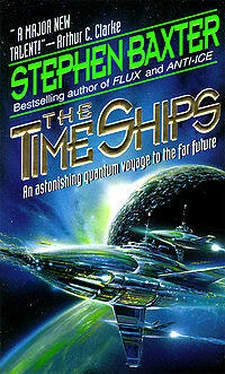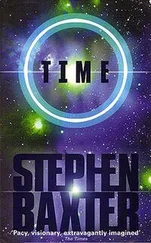Such rectification, I argued, would have a symbolic significance far beyond its practicality — it would be a fitting way to mark the dawn of the new century — for it would serve as an announcement to all men that a new Age of Scientific Thinking had begun.
Needless to say, my contributions were disregarded, save for a ribald response, which I chose to ignore, in certain sections of the popular press.
At any event, after all this, I abandoned my attempts to build a calendar-based chronometric gauge, and reverted to a simple count of days. I have always had a ready mind with figures, and did not find it hard to convert, mentally, my dials’ day-count to years. On my first voyage, I had traveled to Day 292,495,934, which — allowing for leap year adjustments — turned out to be a date in the year A.D. 802,701. Now, I knew, I must travel forwards until my dials showed Day 292,495,940 — the precise day on which I had lost Weena, and much of my self-respect, in the flames of that forest!
My house had been one of a row of terraces, situated on the Petersham Road — that stretch of it below Hill Rise, a little way up from the river. Now, with my house long demolished, I found myself sitting on an open hill-side. The shoulder of Richmond Hill rose up behind me, a mass embedded in geological time. The trees blossomed and shivered into stumps, their century-long lives compressed into a few of my heartbeats. The Thames was a belt of silver light, made smooth by my passage through time, and it was cutting itself a new channel: it appeared to be wriggling across the landscape after the manner of a huge, slow worm. New buildings rose like gusts of smoke: some of them even blew up around me, on the site of my old house. These buildings astonished me with their dimensions and grace. The Richmond Bridge of my day was long gone, but I saw a new arch, perhaps a mile long, which laced, unsupported, through the air and across the Thames; and there were towers upthrust into the flickering sky, bearing immense masses at their slender throats. I thought of taking up my Kodak and attempting to photograph these phantasms, but I knew that the specters would be too light-starved to enable any image to be recorded, diluted by time travel as they were. The architectural technologies I made out here seemed to me as far beyond the capabilities of the nineteenth century as had been the great Gothic cathedrals from the Romans or Greeks. Surely, I mused, in this future era man had gained some freedom from the relentless tugging of gravity; for how else could these great structures have been raised against the sky?
But before long the great Thames arch grew stained with brown and green, the colors of irreverent, destructive life, and — in a twinkling, it seemed to me — the arch crumbled from its center, collapsing to two bare stumps on the banks. Like all the works of man, I saw, even these great structures were transient chimeras, destined to impermanence compared to the chthonian patience of the land.
I felt an extraordinary detachment from the world, an aloofness brought about by my time traveling. I remembered the curiosity and exhilaration I had felt when I had first soared through these dreams of future architecture; I remembered my brief, feverish speculation as to the accomplishments of these future races of men. Now, I knew different; now I knew that regardless of these great accomplishments, Humanity would inevitably fall backwards, under the inexorable pressure of evolution, into the decadence and degradation of Eloi and Morlock.
I was struck by how ignorant we humans are, or make ourselves, of the passage of time itself How brief our lives are! — and how meaningless the events which assail our little selves, when seen against the perspective of the great plastic sweep of History. We are less than mayflies, helpless in the face of the unbending forces of geology and evolution — forces which mold inexorably, and yet so slowly that, day to day, we are not even aware of their existence!
I soon passed beyond the Age of Great Buildings. New houses and halls, less ambitious but still huge, shimmered into existence around me, all about the vale of the Thames, and assumed the opacity, in the eyes of a Time Traveler, that comes with longevity. The arch of the sun, dipping across the deep blue sky between its solstice extremes, seemed to me to grow brighter, and a green flow spread across Richmond Hill and took possession of the land, banishing the browns and whites of winter. Once more, I had entered that era in which the climate of the earth had been adjusted in favor of Humanity.
I looked out over a landscape reduced by my velocity to the static; only the longest-lived phenomena clung to time long enough to register on my fleeting eye. I saw no people, no animals, not even the passage of a cloud. I was suspended in an eerie stillness. If it had not been for the oscillating sunband, and the deep, unnatural day-night blue of the sky, I might have been sitting alone in some late summer park.
According to my dials, I was less than a third of the way through my great journey — although a quarter of a million years had already worn away since my own familiar century — and yet, it seemed, the age in which man built upon the earth was already done. The planet had been rendered into that garden within which the folk who would become the Eloi would live out their futile, pretty lives; and already, I knew, proto-Morlocks must have been imprisoned beneath the earth, and must even now be tunneling out their immense, machinery-choked caverns. Little would change over the half-million-year interval I had yet to cross, save for the further degradation of Humanity, and the identity of the victims in the millions of tiny, fearful tragedies which would from now on comprise the condition of man…
But — I observed, rousing myself from these morbid speculations — there was a change, slowly becoming apparent in the landscape. I felt disturbed, over and above the Time Machine’s customary swaying. Something was different — perhaps some thing about the light.
Sitting in my saddle, I peered about at the ghost-trees, the level meadows about Petersham, the shoulder of the patient Thames.
Then I lifted my face to the time-smoothed heavens, and at last I realized that the sun-band was stationary in the sky. The earth was still spinning on its axis rapidly enough to smear the movement of our star across the heavens, and to render the circling stars invisible, but that band of sunlight no longer nodded back and forth between solstices: it was as steady and unchanging as if it were a construction of concrete.
My nausea and vertigo returned with a rush. I was forced to grip hard at the rails of the machine, and I swallowed, fighting for control of my own body.
It is difficult to convey the impact this simple change in my surroundings had on me! First, I was shocked by the sheer audacity of the engineering involved in the removal of the seasonal cycle. The earth’s seasons had derived from the tilt of the planet’s spin axis compared to the plane of its orbit around the sun. On the earth, it seemed, there would be no more seasons. And that could only mean — I realized it instantly — that the axial tilt of the planet had been corrected.
I tried to envisage how this might have been done. What great machines must have been installed at the Poles? What measures had been taken to ensure that the surface of the earth did not shake itself loose in the process? Perhaps, I speculated, some immense magnetic device had been used, which had manipulated the core of the planet.
But it was not just the scale of this planetary engineering which disturbed me: more terrifying still was the fact that I had not observed this regulation of the seasons during my first jaunt into time. How was it possible that I could have missed such an immense and profound change? I am trained as a scientist, after all; my business is to observe.
Читать дальше
Конец ознакомительного отрывка
Купить книгу









